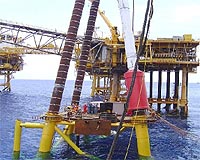 |
Washington (AFP) June 7, 2010 BP captured 11,000 barrels of oil in the last 24 hours from the ruptured Gulf of Mexico well and plans to boost capacity soon to 20,000 barrels a day, the top US disaster control official said Monday. Coastguard Admiral Thad Allen said at a White House briefing that the operation to bring oil to the surface was being carefully ramped up so as not to over stress the delicate containment cap placed on the gushing well. But he said that the US government had yet to pinpoint the exact amount of oil flowing into the sea from the well, and would likely be dealing with residual pollution until relief wells are operational, hopefully in August. And he warned that though the immediate operation to stem the flow of oil and to clean up a rapidly dispersing slick could take months, it would be "years" before Gulf of Mexico environmental habitats return to normal. Allen's briefing represented the Obama administration's latest attempt to demonstrate it is on top of the greatest environmental disaster in US history, as polls show Americans think their government should be doing more. Obama made his third trip to the Gulf Coast on Friday, and slammed BP over the prospect that the firm could still consider making dividend payments to shareholders, as it is pressured to do more to compensate disaster victims. The most closely watched figure from Allen's briefing was the number of barrels of oil currently being processed from the wellhead -- and kept from adding to multiple oil slicks. "We have gone from 6,000 to 11,000," Allen said. BP was "trying to increase that production rate, close the venting valves and move to a greater capacity," he added. White House spokesman Robert Gibbs however said the operation using the containment cap inserted on the well last week,was fraught with difficulty. "This is a delicate cap and we want to ramp this thing up so that this is a solution that we can work with for weeks and months and don't do something too rapidly to cause something tragic to happen." BP hoped to move a second production platform into place soon to boost capacity of oil that could be siphoned off and produced soon, Allen said. It was also preparing a bigger rig with the capacity to process more crude, which might also be able to stand heavier weather, with the US hurricane season gearing up. "We still haven't established what the flow rate is. That is the big unknown that we're trying to hone in and get the exact numbers on," Allen said. Allen said that two current government models put the estimated flow rate out of the well at between 12 and 19,000 barrels a day, or 12 and 25,000 barrels a day, meaning that so far only a fraction of the oil is likely being captured. Turning to the operation to skim, or burn or otherwise break down a massive oil slick threatening the coasts of multiple US states, Allen noted that the pollution was no longer "monolithic" due to ocean currents. "We're dealing with an aggregation of hundreds of thousands of patches of oil that are going a lot of different directions. "Dealing with the oil spill on the surface is going to go on for a couple of months," he said. "Long-term issues of restoring the environment and the habitats and stuff will be -- will be years." Allen also said the administration wanted BP, which operated the Deepwater Horizon rig that exploded in April, to do more to streamline procedures for compensating disaster victims. Many businesses in the Gulf of Mexico rely on fishing, tourism and other industries related to the environment, and the clean-up and compensation bill for the slick is likely to extend into the billions of dollars.
Share This Article With Planet Earth
Related Links Powering The World in the 21st Century at Energy-Daily.com
 CNOOC reviewing offshore drilling safety
CNOOC reviewing offshore drilling safety Beijing (UPI) Jun 7, 2010 China National Offshore Oil Corp said it is focusing on safety issues in light of the Deepwater Horizon oil spill in the Gulf of Mexico. Zhou Shouwei, vice president of state-owned CNOOC, China's largest offshore oil and gas producer, told China Daily the company "ordered checks on every offshore oil and gas project to ensure safety." Zhou said the company has invested close to $ ... read more |
|
| The content herein, unless otherwise known to be public domain, are Copyright 1995-2010 - SpaceDaily. AFP and UPI Wire Stories are copyright Agence France-Presse and United Press International. ESA Portal Reports are copyright European Space Agency. All NASA sourced material is public domain. Additional copyrights may apply in whole or part to other bona fide parties. Advertising does not imply endorsement,agreement or approval of any opinions, statements or information provided by SpaceDaily on any Web page published or hosted by SpaceDaily. Privacy Statement |